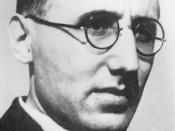The Civilised BodyIn this discussion we are going to examine what the "civilising process" is, how it leads to ones body becoming "civilised" and how this widens the divide between how we see the body as being part of society and as a purely biological entity. I will then attempt to examine how this new perception of the body fits in with our modern society and culture.
So, before we begin, let us look at how bodies were before the civilising process began. In medieval times, the body was seen as a chaotic and purely biological and natural entity. Medieval society was characterized by disease, violent and emotional outbursts and food shortages. There was very little that was conductive to the forming of beautiful bodies. The only bodily regimes in this period were taken up by Christians, namely in monasteries and nunneries, where the inhabitants would stick to a strict diet and exercise bodily control and discipline.
However, with the enlightenment, the sociologist Norbert Elias (1897-1990) has suggested we became increasingly controlling and regulating of our bodily functions and processes. This started off with the formation of "court societies" which were predominantly made up of nobles and monarchy. The people close to the monarch were associated with power and decided to develop different ways of behaving to distance themselves from the "common folk". This involved the adoption of manners, especially at mealtimes and the regulation of emotion, violence and bodily fluids. People who exhibited these traits were seen as having lower status. However, soon the "common folk" picked up on these new ways of behaving and adopted them, this put pressure on the court societies to invent new ways of behaving and monitoring their bodies to keep the distance from the rest of society. Soon behaviour such as urinating in...


